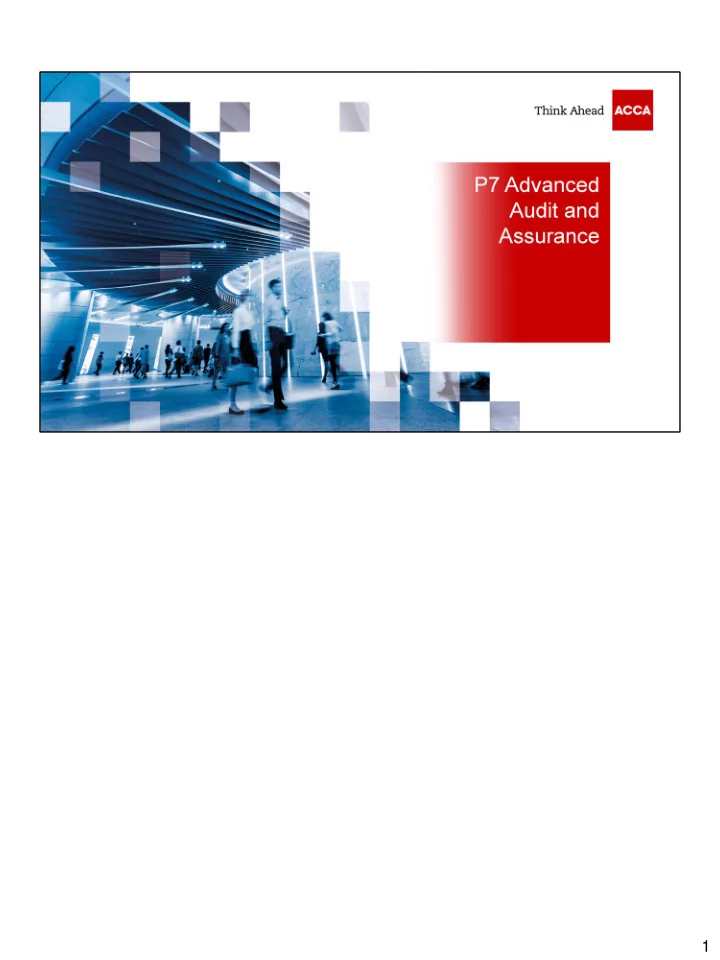

1
2
3
The pass rates continue to be disappointing. For several years the pass rate has been in the low to mid 30% range. Reasons for less than satisfactory performance has been discussed at every past conference and in every past examiner’s report. I encourage all tutors and students to read the examiners reports as they contain very useful information on which requirements were answered well, and where the requirements have not been answered in a satisfactory way, and the reasons for this. Overall there is no significant change in performance since the move to 4 sittings. 4
Underlying factors are as detailed on the slide, and seem to amount to a mixture of not preparing appropriately for the exam combined in many cases with poor exam technique. Weaker scripts demonstrate a tendency to over-rely on rote learning at the expense of demonstrating an ability on applying the skills that an auditor needs. In terms of technical knowledge, candidates should know main ISA requirements and be able to apply them. Question practice is key so they can see how ISA requirements are relevant in different scenarios. An area which appears to be very poorly understood is that of auditor reporting. Perhaps surprisingly, candidates seem comfortable with the new examinable documents in relation to Key Audit Matters, but knowledge of more basic issues like different forms of modification to the audit opinion are not well dealt with at all by the majority of candidates. Financial reporting knowledge is not always good and candidates should remember that the level of financial reporting knowledge needed is P2. Generally, scripts which do not merit a pass mark demonstrate the following: 5
Very poor analytical skills Little ability to apply judgment / explain matters / reach conclusions Tendency to over-rely on rote learning and financial reporting knowledge at the expense of demonstrating an ability on applying the skills that an auditor needs Candidates need to improve their exam technique, for example, managing their time better in the exam, making sure they answer the requirement which is actually given to them and following all instructions in the paper. 5
Performance is better for some syllabus areas, as shown on the slide. These are possibly the less technical parts of the syllabus where common sense and commercial awareness can play a significant role in developing good answer points. 6
7
This is a simple example to illustrate typical responses. The requirement is taken from the Sept/Dec 2016 published sample exam and relates to Q1 which is an audit planning question. The requirements asks for principal audit procedures. Weak answer points are given in the example, to show the kind of responses which candidates might think are valid but would not earn credit because they are too vague or not relevant. Candidates need to be precise and clear in their answer points and make sure they actually answer the question as set. To improve answer points they should be developed to their fullest extent. This does not mean we are looking for very long answer points, just a few more words of explanation can make all the difference. 8
9
There are no changes in the relationship between Advanced Audit and Assurance and its related exams Audit and Assurance and Strategic Business Reporting. 10
No significant changes –the syllabus has been “tidied up” but there are no major new additions or deletions of content area. We have split out the previous syllabus area D (which dealt with the whole audit process)) into two syllabus areas: D – this focusses on planning the audit and obtaining evidence E – this focusses on completion and reporting This has been done to emphasise the different stages of the audit and to better separate out syllabus areas D and E which is important for the new structure of the exam, which will be discussed later in the presentation. 11
12
Section A Case Study: Planning stage of audit Could be single company, group, or several audited entities Range of information provided e.g. draft accounts, company background, analytical review, extracts from working papers Covers syllabus areas A,B,C,D Could include a current issue – syllabus area G 4 professional marks Section B – 2 x 25 mark questions: One question from syllabus area E i.e. completion and reporting The other question could cover any syllabus area other than E 13
14
Recommend
More recommend